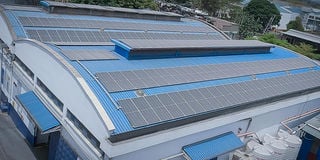Battery manufacturer embraces solar power to reduce operational costs
Sponsored by Associated Battery Manufacturers Ltd

Associated Battery Manufacturers (E.A) Ltd (ABM), the only automotive and solar battery manufacturing company in Kenya, has installed a grid-tie solar solution at its Nairobi manufacturing plant to cut down on their grid electricity costs.
“Our decision to invest in solar energy was driven by the environmental sustainability aspect and cost-saving opportunity. As a manufacturing company, environmental sustainability is a key focus and driving factor for our business as we continuously work towards ensuring compliance with Environmental Social and Governance (ESG) standards. Installation of the grid-tie system has contributed to a reduction in our carbon emission, in line with our environmental sustainability efforts,” says Guy Jack, the ABM Group CEO.
He continues: “From a cost-saving perspective, installation of the 800kW grid-tie system will save us approximately Ksh20 million annually. This is a significant saving in our electricity cost. It enhances efficiency in manufacturing and helps us to cut down our costs.”
When they decided to install a grid-tie solar solution, ABM were specifically looking for a tailor-made, high-quality solution that could power their infrastructure and equipment on a long-term basis. Chloride Solar, a subsidiary of Chloride Exide, was the preferred choice due to their use of high-quality equipment and advanced technology in designing and providing bespoke renewable energy solutions across East Africa over the last 37 years.
Chloride Solar worked on the solar installation project for about six months – from the beginning until the project was commissioned for use. This started with the assessment and analysis of ABM’s power needs, establishing equipment requirements and finally the installation, which took only two weeks.
“Throughout, Chloride Solar demonstrated the highest level of professionalism, competence and expertise. They exceeded our expectations and did an exceptional job in managing the project, ensuring everything was done as scheduled. This culminated in the completion of the project within agreed timelines. Additionally, they provided us with a state-of-the-art solution that enables us to monitor the system’s performance remotely,” says Guy.
The system incorporates smart-monitoring technology that enables ABM to automatically track the performance of the grid-tie solution and carbon emission reduction, and also gives preventative maintenance notifications to Chloride Solar.
“This remote smart-monitoring technology is integrated with ABM’s enterprise resource planning (ERP) system, and we are able to monitor performance directly from our phones. It is a very transparent monitoring system which makes it easy to measure the benefits and the solution as a whole,” says Guy.
With the installation, ABM joins other companies that have either partly or fully moved to solar energy in a bid to increase operational efficiency through reduced electricity costs. Some recent noteworthy installations done by Chloride Solar are Vivo Energy, Mitchell Cotts, KCB Bank, Kenya Civil Aviation Authority (KCAA), World Food Programme, AMPATH, Wildfire Flowers, Karirana Tea Estates – The Home of Eden Tea, Braeburn Schools, and Latia Agribusiness Solutions.
Chloride Solar has also successfully done installations for organisations within East Africa. In Uganda, projects have been done for WWF and the Ministry of Health, while in Tanzania, Aviagen East Africa, University of Sheffield, Ministry of Health, and UNICEF, have tapped the expertise of Chloride Solar.
Following the successful commissioning of the system, ABM has outlined further expansion plans for the solar footprint in their business. Its recycling plant based in Athi River is earmarked for the next phase of solar system installation. According to Guy, ABM estimates that it will recoup its initial investment in getting the project up and running in three years. In his view, given that energy in Kenya constitutes a significant portion of the operational cost, manufacturing companies should consider installing solar solutions as an efficiency measure.


